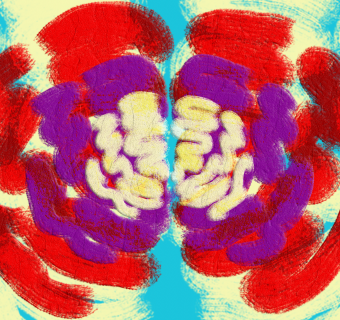You’re at a party. You’re laughing, probably holding a cup of something, or using those hands to wave high in the air, dancing, or grabbing a friend around the shoulders, drawing them into a tight hug. You’re physically there, your feet are firmly planted on the ground,your face branded with a wide grin, elastically stretching and contracting to produce laughs and words. But you feel entirely absent, as though you’re plastered to the ceiling, looking down on your autonomous body down below. On the surface, anxiety disorders, but specifically, social anxiety disorder, work quietly and maliciously. They’re specters, just like many mental health issues. Social anxiety is not to be confused with shyness, or being a homebody, or even being a so-called introvert. Of course, these qualities can inform and reinforce social anxiety, but they are not one in the same. And, surprise, surprise – although you might have guessed due to this article’s publication in Iris, a female-centric publication – anxiety affects women disproportionately. From adolescence to late middle age, women are twice as likely to develop an anxiety disorder as men. Social anxiety involves excessive, deep-seated fears and compulsive behaviors stemming from one’s relationship and interactions with other people. Cases can range from mild to severe, and resulting thought patterns, emotional and behavioral responses can similarly figure across a broad spectrum. Someone with social anxiety might be entirely avoidant of all social situations and interpersonal relationships. Or, they might experience mental compulsions, forcing them to take part in all social activities possible, and to concede any and all demands, requests, and opinions of others for fear of ostracization. And these are just two paths this breed of anxiety can take. Here’s a scenario to help explicate: imagine you’re walking out of the library. You pass a friend, who’s walking through the doors, mid-conversation with someone else. You say “Hey, how’re you?” and they look back, caught off-guard, and respond with “Oh, hey Lily,” and continue to walk. What’s your assumption? Likely, that they were busy chatting with their friend, and, moreover, happened to be walking through the door to the library next to another person, which is an awkward maneuver in itself. Easy enough, right?Not really. Now imagine that you walk into the library, nearly run to the bathroom, and stand at the mirror, flushed and breathing heavily. You are suddenly assured with that one half-Hello that your friend is angry at you. Everything you could have potentially said or done to irritate or upset or disappoint that person since the dawn of time comes flooding into you like a tidal wave. As your breathing increases, you realize they’re not just angry at you for that unidentified action or word. They feel betrayed. Even better, they are going to tell that friend they’re with about it all. And they’re going to hate you. Then that guy or girl you’re seeing or that one friend you have will find out, because that one little story will wend its way through your social environ until you are no one’s anything anymore. No one wants a thing to do with you, and you are alone. How about spending over an hour and a half only staring at your phone screen deciding whether or not to send a single Snapchat to someone with whom you aren’t even close? Perhaps leaving the library despite having a midterm the next day at 9AM that you’ve just started studying for, because your friend asked if you wanted to go to the grocery store with them? (Then throw in the fact that you just went yesterday, and don’t need a single thing.) As much as I’d like to say these are exaggerations, they’re not. These are all very real examples. Some of these situations seem trivial, no? Of course they are. These are random, meaningless, quotidian moments that are, if anything, a mere blip on the radar of one’s daily life. But when you have social anxiety disorder, the continuous onslaught of moments such as these make for utter chaos. Moreover, apply these sorts of disproportionate mental and emotional responses to issues that are more than mundane, like the times when life really gives it to you. Then imagine what you do. Imagine the times when you violate your core beliefs and values because you are terrified of offending or disagreeing with someone. Or when you seek partners who you know will be temporal, who you know are non-committal, even complete jerks because you don’t believe that anyone would actually want to take the time or energy to love you. Both painful instances in any human life. But very frequent, and very damaging moments for those with social anxiety. Living in a state of near constant alarm is not only mentally taxing, but physically draining. Your body possesses a biochemical alarm system that triggers responses to anxiety: constantly tense muscles, nausea, elevated heart rate, resulting exhaustion. Even excessive sweating. Not only due to the quite depressing patterns of thought, but also because of these physical effects, many people with social anxiety fall into states of moderate to severe depression. In my case, you can’t wake up in the morning. You sleep til noon every day. You binge eat Oreos and M&Ms because it makes you feel good, even for just a moment. You don’t exercise. You gain a lot of weight. You can’t even bring yourself to sit down and read a textbook for 10 minutes because you’re too busy feeling worried, or doing the easy and uplifting task of planning all the ways in which your tomorrow will be better, when you’ll be better. Your grades drop. You think your friends are there because they pity you. Sadness fills you without objective reason. And -- if you’re like me, meaning obstinately un-vulnerable -- you don’t let anyone in on it. Not your parents, not your sister, not your friends. Not even those first two therapists you go to. No one. There’s no reason for you to be like this. You’ve had a textbook perfect life, and yet, you feel like this. And that is something to be ashamed of, in your mind. Things get really bad. Not just a few times, but several times. You can't hide things from your parents anymore. You feel like you're burdening them with this, but you're not. You're lucky to have the kind of parents who are so grateful you told them. After many more months of ups and downs and encouragement from your parents, you are finally, and fortunately, able to shake yourself enough to do something about the situation. You're tired of feeling this way. You see three different therapists. The first two don’t help at all. The third one’s the charm. You go on, and you go off medication, then you go on again, and off again. You tell your therapist you want to do this yourself because it will help you more to know you do have some power over yourself. Although she advises you it’ll be a longer process, she agrees that you can do it without the medication. And so you begin. Clearly, I’ve focused quite a lot on my personal situation here in this article. This is partially cathartic. Over the past year my situation improved dramatically and powerfully, thanks to a wonderful therapist, my family, and rediscovering my friends, who I now know have always been there for me. However, the real purpose of my soapboxing is this: to toss a little reminder your way that things change. The one thing I’d say that people with anxiety fear most of all is for things to change without their say-so. Within myself, one of the many things that have changed over the past two years is that I finally know what it’s like to be vulnerable. And frankly, that hasn’t always been a enjoyable change. Opening up to other people is still petrifying, and sometimes it doesn’t go as well as planned. But every time I do it, I never regret it, because at the very least I’ve learned something about myself, and that I am worth the time of worthy people. I’ve learned that no matter who you are or where you’re coming from, vulnerability is the basis of all human connection. People identify with it more than I ever thought possible. Changes are good and bad, and depending on the situation, you might react well or poorly. That’s just what it is, and as much as you may think otherwise, it’s always been that way. To think that there is anything unnatural or unnecessary about change is to be wrong. Even when tendrils of anxiety are curling their way around your neck, even when it is impossible to remember, there’s the fact that things change, and you cannot begin to control most of them. Things around you change and things within you change. Some days you’ll feel great. Others might be some of the worst you’ve yet to deal with. But with time, you’ll find your way, even if that means navigating the bad stuff for awhile. There’s a hell of a (girl) gang here at UVA and in the broader world who are collectively going – and have gone through – a lot of shit, and emerged far better for it. Knowing that simple fact is powerful in itself. It doesn’t take a lot of effort on your part. Simply look around and pay attention. Even if that literally means leaving your phone at home, taking off your backpack, and walking around for a bit. Those people, those things, those places that will bring you solace are there. Those will be the ones you will fall back on, and lift up and take with you when those inevitable tides of change come. For information about how the Women's Center can help with anxiety, contact us here!
Search
More Like This

*This piece talks about mental health, and some aspects of this piece may be triggering for someone recovering. If you are in need of mental health help and are a current UVA student, please contact CAPS (Counseling and Psychological Services) at (434) 243-5150 during the day. If you are in crisis and need help after hours, please call 434-243-5150 or 911 if you need immediate help.
Chloe Lyda
Chloe Lyda

I have a confession to make: lately, I’ve been struggling to keep myself together. I miss deadlines, forget to text people back. Turn things in exactly at 11:59pm. Call it the mid-semester reckoning, or midterm season, or simply being burnt out, but I (and I’m sure many of you) do not know how to manage it lately. Work is boring, I wake up more tired than when I went to sleep. I can’t find inspiration for anything.
Pasha McGuigan
Pasha McGuigan

A soft recovery is vulnerable. Fragile bones in gaunt skin, delicate like egg shells, stress the word wan. Weak.
Another day waking up anxious. Eyes fluttering open are accompanied by a tight chest and a churning stomach. There are no butterflies. September to December brought a four month long writer’s block with one poem and a headache to show for it. Outside grows steadily darker, but the blinds on the bedroom have been broken. It’s been dark since 3:00 pm.
Juliana Callen
Juliana Callen

The Road Not Taken
“Two roads diverged in a yellow wood,
And sorry I could not travel both”
- Robert Frost
Two sides of the same coin
Stuck on the edge
Between the grooves
Waiting to fall
Now I’ll go
Traveling through the path chosen
Opting to have another
Slowly cracking
Always does not mean
Forever
Sadie Randall
Sadie Randall

Does anyone else get how absurd it is?
To hope, you have no choice but to do so wholeheartedly; it is faith and grace and courage, the heaviest and hardest, yet packaged as airy and leavened; it’s “the thing with feathers”, of course.
Even just saying the word, it’s impossible not to open up your mouth and chest, letting out an exhale after.
Lulu Jastaniah
Lulu Jastaniah

The average color of the universe is cosmic latte—a light beige. Not a dark, swirling black or a brilliant flash of yellow. A warm, boring, in the middle beige. Perfectly suited for Goldilocks. I’d like to imagine that if all of my experiences were poured into a glass jar and mixed like a can of paint, a pristine shade of cosmic latte would emerge.
Pasha McGuigan
Pasha McGuigan


